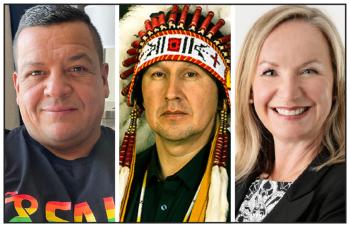Image Caption
Summary
Local Journalism Initiative Reporter
Windspeaker.com
Plenty of positive steps are being taken towards economic reconciliation, but there is still an enormous amount of work that needs to be done.
That seemed to be the consensus of First Nations leaders who spoke during the “Power of Investing: Commitment Towards Indigenous Economic Prosperity” panel on Jan. 11 in Toronto.
The panel was part of the Indian Resource Council (IRC) True ReconciliACTION conference staged at the Marriott Downtown hotel. The IRC was founded in 1987 by oil and gas producing First Nations.
Tony Alexis, chief of the Alexis Nakota Sioux Nation in Alberta, talked about the difficulties Indigenous peoples have endured over the years and how resilient they are.
“In spite of all the challenges that we face, we are today, in 2024, more skilled, more advanced, (have) more capacity, are more sophisticated and ready to do more business,” he said. “We’re here to share that we’ve grown a lot. We’ve come through all those obstacles. And now we’re more sophisticated than ever.”
Alexis said more and more Indigenous people are reaching outstanding academic achievements.
“We’re in a position right now to become a true partner, a quality partner, an important partner to grow our businesses,” he added.
Alexis believes better days are ahead for Indigenous peoples.
“Before contact we lived like royalty,” he said. “Before contact we lived with abundance. Before contact we lived in a way that nobody was starving, that nobody was homeless, that no one had more responsibility from the tribe. We had that and we’re on the path to getting back to that situation.”
Greg Desjarlais, chief of Frog Lake First Nation in Alberta, said better days ahead are possible when non-Indigenous people can find common ground with their Indigenous counterparts.
“I think when we start to look at each other across the table with respect and to start to respect each other as human beings, I think that the world will be a better place,” Desjarlais said. “Using love and kindness and, I think trying to problem solve how do we create a better life for our people. How do we create a space where we feel that we’re being heard, I think is important.”
Desjarlais said relationship building still needs to be worked on.
“First Nations are not opposed to development,” he said. “But what is missing is inclusion. So, if a company is going to make millions of dollars or maybe into the billions, why not look at the traditional territory of the First Nation. So, if we’re hunting and gathering medicines and berries and you decide to put a project there, that’s what we want to be consulted on. What does that mean to us to lose that land and to lose the practices of our ancestors? You can’t put a price tag on that.”
Chana Martineau, the chief executive officer of the Alberta Indigenous Opportunities Corporation (AIOC), believes progress is being made. The AIOC assists Indigenous groups and communities across the province to bring ideas and innovation into action.
“We are moving as fast as we can to help finance major capital projects to support Indigenous communities, both in and around Alberta, to be able to find their rightful place at the economic table,” said Martineau, a Frog Lake First Nation member.
Martineau, who has more than three decades of financial strategy and management experience, said she is seeing more true partnerships now.
“How I look at that, from a personal perspective, is that the Indigenous communities, the First Nations and Métis communities, were only sharing in the risk side of the equation,” she said. “So, of course, the project wasn’t palpable. Would it be palpable for you if it was in your backyard if you only shared in the risk side and not the benefit side?”
But Martineau believes times are changing.
“To me the true partnership is bringing both the benefits and the risk to the project and sharing them as true partners,” she said.
Alexis also talked about the need for equality.
“You have to recognize there is a reason for reconciliation,” he said. “It can’t be just because we want to look good in the light. You need to have the actions that we can grow together because it shows that one group tried to portray themselves a little bit higher than another. So, it was a power position. And in order for that reconcili-ACTION to have a true balance, you have to provide equal in terms of the power. If you look at it in that way, we all have work to do.”
Desjarlais believes accurately portraying the past is something else that needs to occur.
“We have to teach our children and in society if you’re hiding residential schools and you’re hiding the truth, there will be no reconciliation,” he said. “In fact, my Elders say ‘What did I do wrong? What did I do wrong that I need to reconcile?’.
“So, I think moving forward we need to make the wrongs right. We need to have First Nations inclusion. We only want better equality for our people,” he said.
“We’re only trying to get to a place where human rights are met and they’re not looked at as a treaty right. There’s a way that we can all work together, that we can all live in harmony.”
Support Independent Journalism. SUPPORT US!

